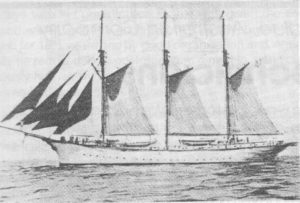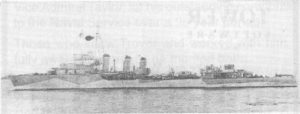- Author
- William F. Cook, MVO, Captain, RAN (Rtd)
- Subjects
- Biographies and personal histories, History - WW2
- Tags
-
- RAN Ships
- None noted.
- Publication
- December 1995 edition of the Naval Historical Review (all rights reserved)
On 1 March, just a few weeks before his 92nd birthday, I had a long and most interesting discussion with Commander Franki, late of the Polish Navy. Although crippled with arthritis and having difficulty in moving about, his memory is remarkable and his sense of humour undimmed. He has obviously spent a life devoted to hard work and a great love of the sea.
Wojceich Franki (pronounced VOY-CHECK FRANSKI) was born in Warsaw in 1903. He came from a middle class family who appeared to have survived reasonably well the vicissitudes suffered by the Polish people during and after WWI. At school he had attained the equivalent of the School Certificate and one of his great interests was the Boy Scouts, in which he developed an expertise in topography – map reading.
In 1919, the Polish Army was fighting for independence against the Bolsheviks, the immediate aim being to push the Russians out of VILNA, the capital of LITHUANIA, which was one part of Poland. Scout Franki volunteered to act as an escort to take Easter gifts and comforts to the troops at the front, the celebration of Easter being of great significance in Poland. On reaching the front, he had ideas of looking for some relatives whom he knew were in the army, but the Sergeant Major to whom he had appealed for assistance, obviously sensing good soldier material in the young boy, persuaded him to join up with his company. So Franki enlisted in the Polish Army!
As is the fate of all recruits, he was given the task of what he called “scavenging potatoes” – “spud bartering”. When the Company Commander heard of this bright young lad he quickly took him out of the galley and into his headquarters. Among his most remarkable feats in the army was a forced march of 83 km between the hours of 10.00 a.m. and 4.00 p.m. on the following day, carrying full equipment weighing 54 kilograms! On another occasion he was sent with important despatches to a unit which could only be reached by train. The weather was bitterly cold and there was no seat or shelter of any kind in the train. His threadbare uniform had little warmth in it, and he arrived at his destination literally “frozen stiff.” He was sent to hospital suffering from exposure and severe frostbite and then evacuated to Warsaw – a 24 hour train journey – where his parents were able to arrange medical treatment, better perhaps than that available in the army. It was six weeks before he recovered and was able to rejoin his unit.
The war ceased in 1920 and for his services as an infantry private he was awarded the Polish Cross of Valour. He was to win this award three more times during his subsequent career in the Polish Navy.

When considering his future in 1921 he found that recruiting for the infant Polish Navy was taking place. He was advised that he could join as a sailor, but unless he had a Higher School Certificate he could not be considered as an officer candidate. However he was given a job in the hydrographic department with the opportunity to study for his H.S.C. Three years later he entered the Naval Academy at GDYNIA and was appointed a sub-lieutenant in 1927. As part of his sea training he did a cruise in the sailing training ship “ISKRA” to Buenos Aires and in 1928 carried out a gunnery course in Toulon, France.
At this time, France was assisting the young Polish Nation in many ways, whilst it was not till well after 1930 that Britain, sensing the re-emergence of Germany as a continental power and possibly an enemy, changed her attitude and opened their shipyards for Polish warship construction.

In August 1939, Franki was in command of the training ship “WILIA” which was in the Mediterranean. His old destroyer squadron had sailed from the Baltic and had arrived in Scapa Flow on 1 September. The Royal Navy had offered a haven in any British port to ships of the Polish Navy, so with the approval and the help of the French at Casablanca, “WILIA” sailed to Gibraltar. Franki then proceeded via a British base in Brest to Devonport which became the site of a shore base for Polish Officers and ratings in the U.K. In October 1939, as a Junior Commander he was appointed in command of the Polish destroyer “BURZA” (pronounced BOOZER, he informed me!) She was based in HARWICH and in her he took part in the Norwegian Campaign in company with the Polish destroyers “BLYSKAWICA” (whisky whisky!) and “GROM”.




